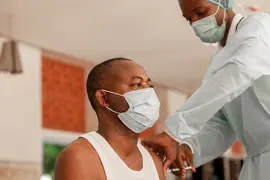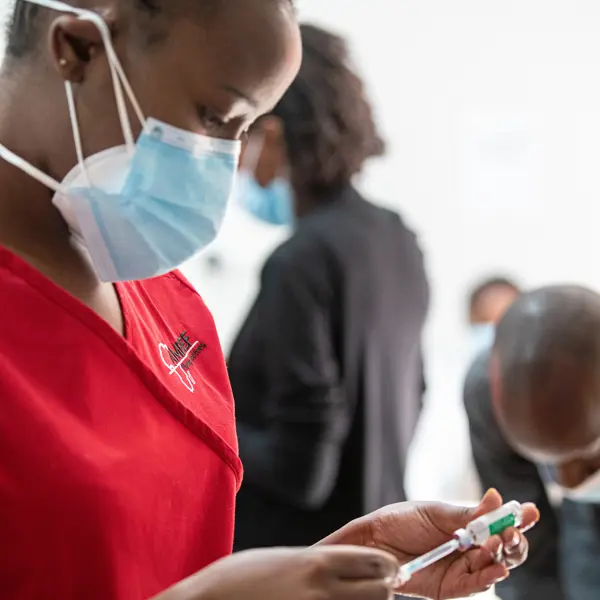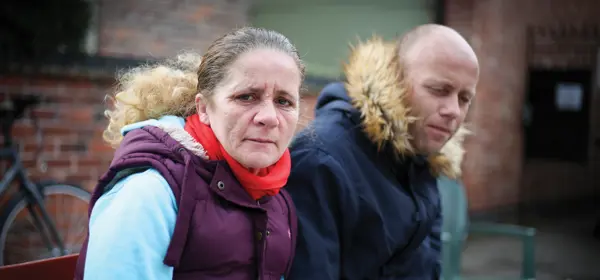
COVID vaccines: a question of justice
Richer countries are stockpiling hundreds of millions of excess doses of COVID vaccine, while their poorer neighbours are desperately short. Who can justify this needless cost in human lives?
By the end of December, more than 12.2 billion doses of COVID vaccine will have been produced worldwide, according to the latest forecasts.That’s enough for everyone on the planet to have at least one jab. Yet, the world map of vaccine distribution is heavily skewed.
The UK alone has procured enough doses to vaccinate its entire population three-and-a-half times over. Uganda, by contrast, has secured just 0.44 doses per adult.
According to Bloomberg, it would take just five months to vaccinate 75 per cent of the global population if the world took steps to even out distribution.
But at current rates, it will take five-and-a-half years before three-quarters of Uganda’s population are vaccinated. Meanwhile, the cost of that inequity is being counted in lives lost.
Life on hold
James Eyul and his wife were optimistic when they received their AstraZeneca jabs because of his responsibility for port health at Entebbe International Airport.
Dr Eyul had identified Uganda’s first COVID case in March 2020: a person on business flying home from Dubai. The vaccine proved its worth just three weeks later when two of Dr Eyul’s children caught COVID, at the peak of Uganda’s second wave in June.
Their teenage brother caught it too: their parents escaped. Their household was a useful test case for the vaccine’s doubters and detractors.
But, as cases rose sharply, vaccines remained in limited supply – and still are. By late-October, only 3.9 per cent of Uganda’s population had received even a single dose.
When the vaccines come, they get used up fast. But then we have to wait several weeks for the next batch
Dr Eyul
‘If we had had adequate vaccine in Uganda’s second wave, I believe we could have prevented a lot of severe infection and checked the spread,’ says Dr Eyul.
Five months on, life remains on hold. Schools have been shut for the best part of 18 months; the night-time curfew still stands. Poverty, crime and teenage pregnancy rates have all soared.
Dr Eyul insists his country is well equipped to deal with infectious disease – given the proper tools. He has worked in infectious disease control in camps for displaced people, with the health NGO Amref Health Africa.
His first weeks in the job at Entebbe International in 2014 coincided with an outbreak of Ebola in neighbouring Democratic Republic of Congo.
Uganda has lots of experience in tackling outbreaks, including yellow fever and Marburg virus.
‘The distribution system for vaccines in Uganda is robust: the problem is getting vaccines into the country,’ says Dr Eyul. ‘People are lining up to get the vaccines, and when they come, they get used up fast. But then we have to wait several weeks for the next batch.’
Stockpiles and shortages
A few short months ago, wealthier nations agreed that global vaccine equity was a moral imperative. In the slogan, ‘No one is safe until everyone is safe,’ they recognised it was enlightened self-interest too.
Today, international comparisons of vaccine procurement and rollout are shocking. By late-October, enough COVID doses had been administered to fully vaccinate 44.6 per cent of the global population.
Yet, while 62.79 per cent of people in HICs (high-income countries) had had at least one dose of vaccine, the figure for LICs (low-income countries) was just 4.51 per cent. COVAX, the platform set up to help LICs equitably access vaccines at subsidised prices, has shifted its goal of delivering 2 billion doses from this year to next.
By April 2021, the UK had distributed the same number of vaccines domestically – 38 million – as COVAX had globally. The issue is not global supply but access and fair distribution. HICs have secured a disproportionate amount of vaccine doses – far beyond what they need, even after booster jabs for high-risk groups and double jabs for the over-16s – and are hoarding their surplus. In early October, MSF (Médecins Sans Frontières) estimated the size of this stockpile for 10 HICs at 870 million excess doses.
The BMA has written to the prime minister calling for him to be transparent on the number of surplus doses in the UK and to increase and accelerate UK pledges to COVAX. The Government has since announced it will accelerate its COVAX donations to the tune of 30.6 million doses in 2021 by year end.
Arielle Nylander, BMA senior policy adviser for global health, says: ‘People are dying now, so we need to be mobilising the doses that we have now. They’re not doing any good sitting on shelves, waiting for people who might need them in the future, when they could be saving lives right now.’ Time is of the essence – but countries, including the UK, have been slow to share.
Vaccines are not doing any good sitting on shelves when they could be saving lives right now
Ms Nylander
The UK only started sharing doses in July, when 86 per cent of UK adults had had a first dose. It has committed to donating 100 million doses by June 2022 – yet had shared fewer than nine million doses by September.
Alarmingly, many jabs may expire before they are used – a scenario the BMA believes must be avoided at all costs.
A September forecast by data firm Airfinity warned that G7 and EU countries alone could waste 241 million doses due to expire by the end of the year, even after boosters were delivered and donations pledges fulfilled.
Hoarding means that vaccines are being shared with LICs close to their expiry dates and at short notice. In March, South Sudan, for example, received AstraZeneca vaccine through both COVAX and the African Union but much of it had to be passed on to other countries – and some of it reportedly destroyed – because it could not be used in time. By late-October, only 0.74 per cent of South Sudan’s population had received at least one jab.
South Sudan faces many challenges: most of the nation is inaccessible by road, and severe flooding in some areas recently has hampered distribution.
Conflict has fuelled a severe hunger crisis: malnutrition and tuberculosis rates are high. Often, it falls to NGOs to support vaccination drives, especially in remote areas.
Amref Health Africa, for example, is training health workers, setting up mobile clinics, addressing vaccine hesitancy and helping with transportation, as well as lobbying for vaccine equity with its #VaccineSolidarity campaign.
One of its partners is Juba Teaching Hospital where Dr Arecro Richard Makur and her nursing colleague, Suzan Poni Loro, are involved in the vaccination programme, which is focusing on society’s most vulnerable. Hesitancy about the AstraZeneca jab has been a significant hurdle.
‘Rumours were circulating on social media that the vaccine caused blood clots and infertility,’ says Dr Makur. ‘We tell them it’s safe and that it will protect them from disease, but it takes time.’
She is hoping the vaccine rollout will gather momentum now the single-dose Johnson & Johnson vaccine has arrived in South Sudan, donated by the USA.
Ms Poni Loro urges the international community to keeping sending them vaccine. ‘We know it works because when we started the vaccine, case numbers dropped. We are very worried that if it rises up again here, people are not vaccinated.’
Knowledge transfer
Meanwhile, the question of expanding vaccine-manufacturing capacity in LICs is hotly debated. Pre-pandemic, vaccine manufacturing was heavily concentrated in the EU, USA and India.
China has becoming the largest exporter of COVID vaccine, flexing its soft power in poorer regions, especially since India’s Serum Institute halted exports during its national COVID emergency.
MSF and the People’s Vaccine Alliance want to see intellectual property barriers removed at the World Trade Organisation, arguing that they block the crucial increase and diversification of vaccine production. Vaccines developed with public funding in public labs should be considered a public good, they say.
There is an acknowledgement, however, that removing intellectual property barriers alone will not solve the problem: transferring technological know-how is vital too.
Moderna has said it will not enforce its intellectual property rights on anyone manufacturing its vaccine during the pandemic – but, as Ms Nylander points out, it has not yet released information on how to produce the mRNA COVID vaccines, including to the new WHO-backed ‘tech transfer hub’ in South Africa.
COVAX has been left dependent on the charity of high-income countries
Ms de Milliano
Some smaller issues could be resolved more easily. Victorine de Milliano, MSF Access Campaign policy adviser, points out that pharmaceutical companies are jeopardising COVAX’s ‘humanitarian buffer’ – designed to ringfence vaccine for the highly vulnerable communities including refugees – by insisting NGOs carry liability for any adverse effects from vaccines they distribute. Whatever their differences, most agree the current system is failing.
‘Pandemic preparedness and response’ will be discussed at a special session of the World Health Assembly later this month: WHO director general Tedros Adhanom Ghebreyesus has called for clear ‘rules of the game’ to ensure ‘such shocking inequities are not repeated’ in future pandemics.
Ms de Milliano agrees: ‘COVAX is built around the parameters of the existing market system of supply and demand, where you see what you can negotiate with industry based on how much money you have. This hasn’t served COVAX well, and has largely left it dependent on the charity of high-income countries. That’s not how you counter a global pandemic.’
Meanwhile, the cost of inequity remains unacceptably high. If surplus vaccines are not redistributed equitably this year, up to five million more lives ‘hang in the balance’, according to former prime minister Gordon Brown, now a WHO ambassador for global health financing. Dr Eyul in Uganda urges the international community to learn the lessons of the past.
The world’s failure to commit resources equitably to tackle malaria in the 1950s – allowing it to persist in Africa – means malaria remains a global threat. ‘The world should wake up and not let history repeat itself,’ says Dr Eyul.
‘Let’s give the rest of the world vaccines in time. Otherwise COVID will come back, worse than before.’



